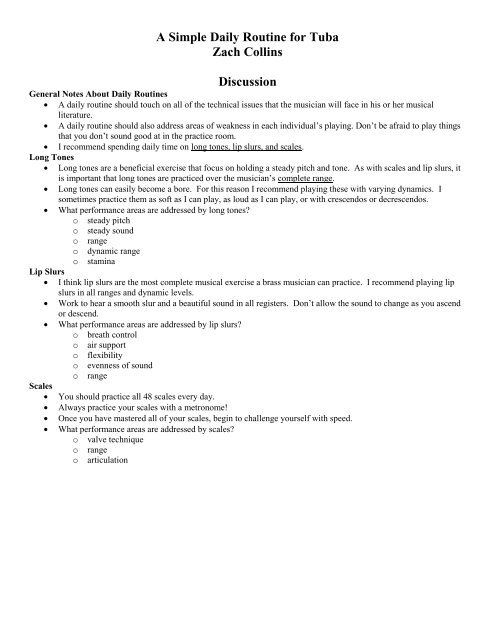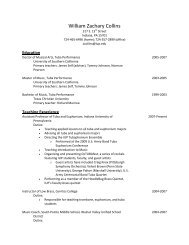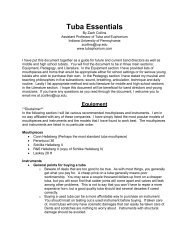A Simple Daily Routine for Tuba Zach Collins Discussion
A Simple Daily Routine for Tuba Zach Collins Discussion
A Simple Daily Routine for Tuba Zach Collins Discussion
You also want an ePaper? Increase the reach of your titles
YUMPU automatically turns print PDFs into web optimized ePapers that Google loves.
A <strong>Simple</strong> <strong>Daily</strong> <strong>Routine</strong> <strong>for</strong> <strong>Tuba</strong><br />
<strong>Zach</strong> <strong>Collins</strong><br />
<strong>Discussion</strong><br />
General Notes About <strong>Daily</strong> <strong>Routine</strong>s<br />
A daily routine should touch on all of the technical issues that the musician will face in his or her musical<br />
literature.<br />
A daily routine should also address areas of weakness in each individual’s playing. Don’t be afraid to play things<br />
that you don’t sound good at in the practice room.<br />
I recommend spending daily time on long tones, lip slurs, and scales.<br />
Long Tones<br />
Long tones are a beneficial exercise that focus on holding a steady pitch and tone. As with scales and lip slurs, it<br />
is important that long tones are practiced over the musician’s complete range.<br />
Long tones can easily become a bore. For this reason I recommend playing these with varying dynamics. I<br />
sometimes practice them as soft as I can play, as loud as I can play, or with crescendos or decrescendos.<br />
What per<strong>for</strong>mance areas are addressed by long tones?<br />
o steady pitch<br />
o steady sound<br />
o range<br />
o dynamic range<br />
o stamina<br />
Lip Slurs<br />
I think lip slurs are the most complete musical exercise a brass musician can practice. I recommend playing lip<br />
slurs in all ranges and dynamic levels.<br />
Work to hear a smooth slur and a beautiful sound in all registers. Don’t allow the sound to change as you ascend<br />
or descend.<br />
What per<strong>for</strong>mance areas are addressed by lip slurs?<br />
o breath control<br />
o air support<br />
o flexibility<br />
o evenness of sound<br />
o range<br />
Scales<br />
You should practice all 48 scales every day.<br />
Always practice your scales with a metronome!<br />
Once you have mastered all of your scales, begin to challenge yourself with speed.<br />
What per<strong>for</strong>mance areas are addressed by scales?<br />
o valve technique<br />
o range<br />
o articulation
<strong>Daily</strong> <strong>Routine</strong><br />
***If you are starting a daily routine <strong>for</strong> the first time I would recommend beginning with a routine of long tones, slow lip<br />
slurs, fast lip slurs, and scales. This should take from 30 min to one hour. Once you have established a consistent routine,<br />
you can then add in elements from the additional exercises section of this routine. A good rule of thumb is that a daily<br />
routine should be about half of your total practice time <strong>for</strong> the day.<br />
Long Tones (approx. 10 minutes)<br />
Recommended exercise<br />
o Play each chromatic pitch in the order below from Bb in the staff to Bb below then staff. Then play Bb in<br />
the staff upwards as high as possible. Then begin with Bb below the staff and go downwards as low as<br />
possible (including pedal tones). This pattern can be transposed upwards by one step <strong>for</strong> the CC tuba.<br />
Lip Slurs (10-30 minutes)<br />
Recommended exercises<br />
o Each pattern should be continued down chromatically [0, 2, 1, 1-2, 2-3, 1-3 (4), 1-2-3 (2-4), 1-2-4, 2-3-4,<br />
1-3-4, 1-2-3-4] using the same fingering <strong>for</strong> all five notes.<br />
Slow Lip Slurs<br />
There is no need to go <strong>for</strong> speed on these exercises. I recommend practicing these around quarter note = 60-80<br />
A.<br />
C.<br />
B.<br />
D.<br />
Fast Lip Slurs<br />
These exercises should first be mastered at a slow speed. Once that is accomplished, see how fast you can play<br />
these cleanly.<br />
A.<br />
C.<br />
B.<br />
D.<br />
Scales (10-20 minutes)<br />
Play all 48 scales (major, natural minor, melodic minor, harmonic minor) as well as chromatic scales in as many<br />
octaves as you can handle.<br />
Once you have your scales mastered, see how fast you can play them cleanly.<br />
Feel free to try different articulations and dynamics while practicing scales.<br />
Visit the “resources” section of the <strong>Tuba</strong>phonium website (www.tubaphonium.com) to print scale sheets.
Additional Exercises<br />
Octave and Extended Lip Slurs<br />
As with the lip slurs above, keep these slurs on the same valve combination. Descend down chromatically.<br />
Octave Lip Slurs<br />
A. B.<br />
Extended Lip Slurs<br />
A.<br />
B.<br />
C.<br />
D.<br />
E.<br />
Tonguing Exercises<br />
A simple way of practicing articulation is to use scales. Scales can be practiced at various volumes and<br />
articulations (marcato, staccato, legato, etc…)<br />
Articulation can also be practiced on single pitches with patterns such as the ones below. Feel free to make up<br />
your own pattern.<br />
A.<br />
B.<br />
etc…<br />
C.
etc…<br />
Multiple Tonguing<br />
The tonguing exercises above can be used <strong>for</strong> double tonguing exercises<br />
The Arban book includes several progressive etudes that are useful<br />
I also recommend the patterns below<br />
A.<br />
B.<br />
etc…<br />
C.<br />
etc…<br />
D.<br />
etc…<br />
E.<br />
F.<br />
etc…<br />
G.<br />
etc…<br />
Low Register Exercises<br />
Work on Bordogni (Rochut) etudes down one octave (or two if playing from Rochut)<br />
Work on Snedecor Low Register etudes





